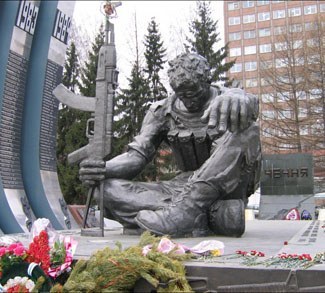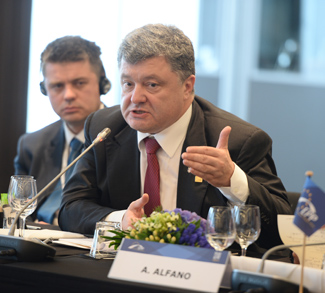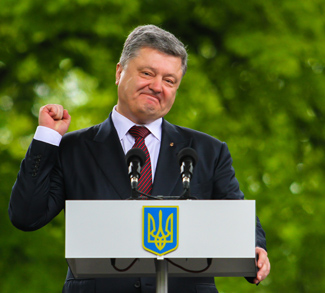To many, Russia’s – and more pointedly, Putin’s – incursion into Ukraine revealed a desire to reclaim the lands that ‘got away’ during the dissolution of the Soviet Union in 1991.
However, this blunt-force, defy-all-international-norms takeover of Crimea might have done quite a bit to weaken and potentially destabilize Russia’s relations with Belarus and Kazakhstan, arguably the two post-Soviet states most open to any sort of reconfiguring of the post-Soviet space that might mirror Soviet foreign policy.
But first, some background. For the past few years, Putin has been advancing a project to reconstruct the economic network which formally existed between Moscow and its satellite states by launching negotiations to create a ‘customs union’ which would abolish tariffs and visas between participating countries and fortify inter-nation trade.
The core partnership would be between Russia, Kazakhstan, and Belarus, with the expectation that goods would flow freely over borders and greatly increase the potential market for Kazakh and Belarusian companies. The union officially launched on January 1, 2010 and Putin has continuously spoken of his desire to create a larger ‘Eurasian Union’ – scheduled to be initiated in 2015 – including more post-Soviet states.
Putin also aggressively pressured other former Soviet states – namely, Ukraine – to join the economic association, which Ukraine roundly and repeatedly rebuffed.
The first hint that Russia was willing to go to great lengths to bring Ukraine back into its sphere of control came in January 2013, with Gazprom slapping Kiev with a $7 billion gas bill for gas that the country had committed to purchasing but in fact never did.
Other states felt varying degrees of pressure to accede to the customs union; Moscow came down on Armenia to join, but was more ambivalent about Kyrgyzstan and Tajikistan, considering that it already has its hands full with swathes of Central Asian migrants and loosening the trade barriers would just compound the problem in Moscow’s view.
Meanwhile, Kazakhstan and Belarus continued to have untroubled relations with the regional superpower – not a small accomplishment in this volatile region. Negotiations over the expansion of the customs union and the development of the Eurasian Union continued with few hiccups, and the project appeared on track.
That is, until Russia moved into Crimea.
The tight-knit group has now splintered, with Belarus’ president-for-life Aleksandr Lukashenko publicly criticizing Moscow’s move into Ukraine as a ‘bad precedent.’ The government of Lukashenko’s Kazakh counterpart Nursultan Nazarbayev, also a president-for-life, took a more nuanced approach, saying that Crimea had participated in a fair referendum while emphasizing Kazakhstan’s “commitment to the fundamental principles of international law.”
It is somewhat surprising to hear Lukashenko frankly criticize Moscow, given just how intertwined Belarus’ economy is with Russia and how dependent his regime is on Russian resources, especially in the defense sector. Belarus’ economy remains opaque to outsiders but by most accounts is very weak with severely lagging productivity and growth rates, possibly propped up only by a $2 billion loan from Moscow earlier this year.
But Belarus also contains a sizable population of ethnic Russians – one of Moscow’s main justifications for moving in on Crimea. And Lukashenko, even after twenty years in power, will not abide by any threat to ‘his’ territory or his power, no matter the economic or military stakes. This wariness towards Russia’s foreign policy objectives is relatively new to Belarus, and underlines just how jarring Putin’s Ukraine adventure has been for the country.
Kazakhstan, however, has had a slightly more removed relationship to Moscow than has Belarus. Kazakhstan has never sought to be closely tied with Russia, as Belarus had in the late 1990s and 2000s when it pushed to have a unified currency, preferring instead to operate in a cooperative but decidedly separate manner.
The Kazakh government is also particularly sensitive to its own cultural divisions, with the northern half of the country inhabited mostly by ethnic Russians while southern Kazakhstan’s population is heavily ethnic Kazakh.
Concerns about a potential Russian invasion or forced annexation of the country’s northern half was reputedly behind Nazarbayev’s desire to upend the country’s capital from the southern economic center of Almaty to Astana. When the capital was moved in 1995 to its northern position, Astana was an underdeveloped town with few of the amenities of the much more cosmopolitan Astana.
Rocking the boat too strongly by voicing open criticism of Russia’s foreign policy could also have serious impacts on Kazakhstan’s economy, a fact which is not lost on its long-serving ruler. In many ways, Kazakhstan stood to benefit most from the customs union as its potential market would extend beyond the 16 million in Kazakhstan to nearly 170 million – giving its burgeoning manufacturing sector plenty of room to grow.
However, Kazakhstan’s main industry – energy – could sustain a substantial hit from US and EU sanctions against Russia. Kazakh oil is transported via the Caspian Pipeline Consortium to Russia. If sanctions are imposed on Russian oil exports, the Kazakh government will be severely impacted. Kazakhstan will be sure to be ever more wary of further integration with Russia if it suffers economic blowback from Russia’s violation of Ukrainian sovereignty.
Tensions are set to rise after Kazakhstan suspended Russian missile tests in the past week after a Russian rocket crashed near a Kazakh village. According to Russian newspaper Izvestiya, Russia is planning to establish several missile sites near the Kazakh-Russian border to protect the region from ‘external threats’.
The tripartite club was initially established to form the bedrock for a future, pan-Eurasian international organization which might have one day morphed back into a transnational union, if Putin got his way. But events on the Black Sea have thrown those plans into uncertainty.
Jax Jacobsen is a contributor to Geopoliticalmonitor.com



